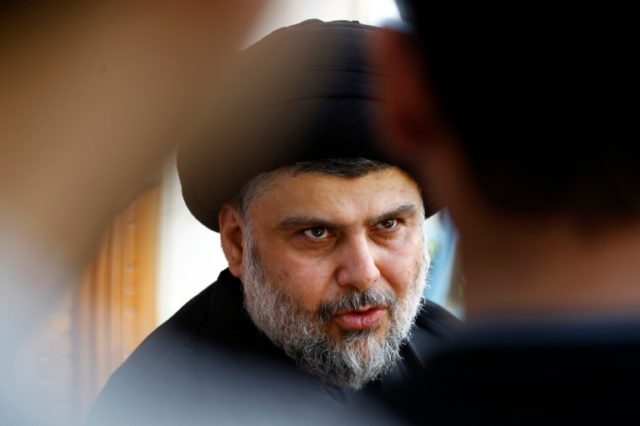Baghdad (AFP) – Moqtada al-Sadr is the scion of an influential clerical family who raised a rebellion after the 2003 US invasion of Iraq and has now reinvented himself as a reform champion.
Sadr, who has a grey-streaked, bushy black beard and wears the black turban of a “sayyid” or descendant of the Prophet Mohammed, gained widespread popularity in the months after the 2003 invasion of Iraq.
His rise, aided by the reputations of two famed relatives — including his father, Grand Ayatollah Mohammed Mohammed Sadiq al-Sadr — killed during Saddam Hussein’s rule, eventually translated into political power.
He has repeatedly bowed out of politics over the years only to later return, most recently by calling for protests and sit-ins aimed at pressuring the government to carry out reforms.
Sadr’s intervention revitalised a moribund pro-reform protest movement, but it has also positioned him to wield a level of direct political influence that he has not had in years.
“Sadr has appeal within the Iraqi Shiite grassroots and he is using that dynamic as leverage to reinvigorate his base and the Sadrists’ political fortunes,” said Ahmed Ali of the Institute of Regional and International Studies at the American University of Iraq.
Weeks of protests and inaction by lawmakers boiled over on Saturday, with demonstrators, many of them Sadr supporters, breaking into Baghdad’s fortified Green Zone and storming parliament.
While he had previously threatened to have his supporters storm the area before, he did not publicly order them to do so.
After the invasion that toppled Saddam, Sadr commanded the Mahdi Army militia, which fought fierce battles with American and Iraqi government forces, and he was identified by the Pentagon in 2006 as the biggest threat to stability in Iraq.
The Mahdi Army — estimated to have had up to 60,000 members — was once the most active and feared armed Shiite group in the country, and was blamed by Washington for death-squad killings of thousands of Sunnis.
But in August 2008, Sadr suspended the activities of the Mahdi Army after major US and Iraqi assaults on its strongholds in Baghdad and southern Iraq.
– Political kingmaker, religious student –
Following the ceasefire, US military commanders said Sadr’s action had been instrumental in helping bring about a significant decrease in the levels of violence across Iraq.
He nonetheless continued his vocal opposition to the US military presence in the country.
Sadr repeatedly called for a total US pullout and threatened attacks if it was not carried out, as Washington and Baghdad held negotiations on a possible post-2011 US training mission that was ultimately not approved.
He left the country at the end of 2006 or the beginning of 2007, according to US and Iraqi officials, and reportedly pursued religious studies in the Iranian holy city of Qom.
Sadr returned in early 2011, and then shuttled between Qom and Najaf, his base south of Baghdad. But he showed he could still pull powerful political strings even during his self-imposed exile.
After throwing his weight behind Shiite politician Nuri al-Maliki in 2006, ensuring he became prime minister, Sadr then ordered his followers to pull out of the premier’s cabinet the next year, almost bringing down the government.
Sadr’s bloc contested the 2010 legislative election in an alliance with the Supreme Iraqi Islamic Council, another Shiite group with links to Iran.
The Sadrists were widely seen as kingmakers after the inconclusive polls that eventually saw Maliki gain a second term as premier.
But Sadr was a sharp critic of Maliki in subsequent years, calling on him to resign and terming him a “dictator” hungry for acclaim.
Sadr later increasingly turned his attention to religious studies, and announced in 2014 that he was withdrawing from politics.
He still made periodic statements on politics and also renewed his militia in 2014, tasking it with defending Iraqi religious sites after the Islamic State jihadist group overran large areas north and west of Baghdad.
And as the driving force behind recent demonstrations in Baghdad, Sadr has once again translated his ability to rally thousands of devoted supporters into political influence.

COMMENTS
Please let us know if you're having issues with commenting.